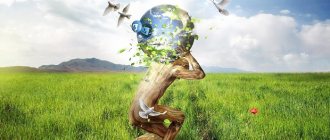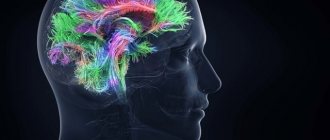Modern science and social science are actively engaged in the study of the biological and social components of man. The biological characteristics of a person, like the social ones, consist of a number of features that equally influenced his evolutionary development.
From this it proceeds that the biological and social in a person form an equal ratio, that is, a person is a biosocial individual and has a dual nature, being a symbiosis of nature and the social system.
Next, both types of human characteristics and their examples will be briefly discussed.
What is character?
- Character, personality, personality refers to the sum of characteristics that a person possesses. Character refers primarily to moral qualities, ethical standards, principles and the like; a man of impeccable character.
- Individuality refers to the distinctive qualities that make a person recognizable as an individual different from others; a woman with a strong personality.
- Personality refers to the combination of external and internal characteristics that determine the impression a person makes on others: a child with a bright or pleasant personality.
Work
A characteristic distinguishing feature of a person is work. Only people are capable of creating consciously. Society develops a culture that includes material values created with its own hands. Not a single animal in the world is capable of working and inventing. A person has everything for this: a brain, special thinking, and hands that are ideal for using a variety of tools. A completely understandable phenomenon. Animals simply have a body structure unsuitable for work.
People also have abstract thinking. In other words, you can imagine without any problems what this or that object looks like, which does not exist in nature. Animals are not capable of this. Plus, a person strives for cultural development. He is able to create, create a variety of cultural values. As they say, work distinguishes man from animal. And indeed it is.
Things
Clothes and shoes are two more features that make a person stand out. It is with their help that people provide themselves with warmth and comfort. This is a replacement for wool. No one else in the living world wears clothes or shoes. They became distinctive features only for humans.
True, at the moment they even create special clothes for animals. Fortunately, such innovations take place only in relation to pets - dogs and cats mainly. But animals can do without clothes. But people don’t. Therefore, you should not neglect this point. A person makes his own shoes and things, and then wears them.
Upright walking
The next distinguishing factor that occurs is upright posture. A person walks upright and straight. Primates and animals cannot do this. Usually they still rely on their forelimbs or do not hold their body quite straight.
Walking on two legs is typical primarily for humans. In the animal world, there are also some species that walk on two legs. But, as already mentioned, the body is not completely straightened. Only man is capable of walking perpendicular to the earth.
The nature of human temperament
Definition 3
Temperament – 1) stable individual mental characteristics that persist for many years or a lifetime; 2) individual characteristics that characterize the speed, rhythm of mental processes, and the level of stability of feelings.
In order to determine what type of personality a candidate is, you need to talk to him. It is assumed that temperament directly depends on the innate physiological characteristics of a person and the type of nervous system. Therefore, temperament is considered a stable phenomenon. But over the course of life, the nervous system changes, depending on:
Wool
A person has distinctive features in terms of hair. Even with the naked eye you can see that many representatives of the animal world are covered with fur or feathers/scales. This was designed by nature for protection from enemies, cold and for camouflage.
For people, things are a little different. A person does not need wool to protect himself from the cold, so the hairline is preserved only in some places. For example, in the armpits and on the head. In men, hair appears on the face and chest, but the entire body is not completely covered with a continuous layer of fur or fluff.
A person has distinctive characteristics. But which ones exactly? What else can distinguish it on Earth?
Will
Will is the ability of a person to consciously control his psyche and actions.
Thanks to will, a person is able to consciously control his own behavior and his mental states and processes. With the help of will, a person exerts a conscious influence on the world around him, introducing into it the necessary (in his opinion) changes.
The main sign of will is associated with the fact that, in most cases, it is associated with a person making reasonable decisions, overcoming obstacles and making efforts to realize his plans. A volitional decision is made by an individual in conditions of contrasting, multidirectional needs, drives and motives that have approximately the same driving force, due to which a person always needs to choose one of two/several.
Will always implies self-restraint: acting in one way or another to achieve certain goals and results, realizing certain needs, a person acting according to his own will must always deprive himself of something else, which perhaps seems more attractive and desirable to him. Another sign of the participation of will in human behavior is the presence of a specific plan of action.
An important feature of volitional effort is the absence of emotional satisfaction, but the presence of moral satisfaction that arises as a result of the implementation of the plan (but not in the process of implementation). Very often, volitional efforts are directed not at overcoming circumstances, but at “defeating” oneself, despite one’s natural desires.
Mainly, will is what helps a person overcome life’s difficulties and obstacles along the way; something that helps you achieve new results and develop. As one of the greatest writers of the 20th century, Carlos Castaneda, said: “Will is what makes you win when your mind tells you that you are defeated.” We can say that the stronger a person’s willpower, the stronger the person himself (this means, of course, not physical, but internal strength). The main practice for developing willpower is its training and hardening. You can start developing your willpower with very simple things.
For example, make it a rule to notice those tasks, the postponement of which devastates you, “sucks energy” and the implementation of which, on the contrary, invigorates, energizes and has a positive impact. These are the things that you are too lazy to do. For example, tidying up when you don’t feel like it at all, doing exercises in the morning by getting up half an hour earlier. An inner voice will tell you that this can be postponed or that it is not necessary to do this at all. Don't listen to him. This is the voice of your laziness. Do it as you intended - after that you will notice that you feel more energetic and alert, stronger. Or another example: identify your weaknesses (this could be aimless spending time on the Internet, watching TV, lying on the couch, sweets, etc.). Take the weakest one and give it up for a week, two, a month. Promise yourself that after a designated period you will return to your habit again (if you want, of course). And then - the most important thing: take the symbol of this weakness and keep it with you at all times. But do not give in to the provocations of the “old you” and remember the promise. This is training your willpower. Over time, you will see that you have become stronger and can move on to giving up stronger weaknesses.
But nothing can compare in terms of the power of influence on the human psyche as another property of his personality - emotions.
Quick comparison table
In general, humans and animals have fundamental differences affecting the body and behavior:
| Human qualities | Features of the animal |
| Behavior outside of stereotyped models, the ability to make plans and change the environment. | Preoccupation with instincts, the desire to conform to the environment. |
| Predisposition to create improved tools. | Use of bodily tools such as claws and fangs. Rare use of natural environment objects. |
| The desire for spiritual benefits, knowledge of the inner world. | Satisfying the basic needs necessary for survival and procreation. |
Social character of personality
The concept of social character was introduced into science by E. Fromm.
The social character of a person
is a set of traits that arises in people who are part of the same social group. Moreover, these special features appeared under the influence of common experiences and an identical lifestyle.
The psychologist has developed two types of social characters: unfruitful and fruitful.
Unfruitful
| Type of social character | Its signs |
| Receptive | Characterized by weakness of will, servility, low activity, cowardice. |
| Operational | Ambition, a high level of aggression, egocentrism, and arrogance are inherent. |
| Cumulative | Dominant signs: lack of creativity, causticity, stubbornness, possessive instinct, suspiciousness, |
| Market | Characterized by such features as: lack of integrity, unprincipledness, low sense of purpose |
These types are called unfruitful because they are “takers”, believing that they can only receive benefits from the outside.
Fruitful type
This is a kind of humanistic ideal to which we need to strive. It is characterized by: reliance on one’s own strengths and their use both to receive benefits and to give to other people. A fruitful social character gives and does not receive; it is based on love, the highest degree of which is maternal love, which does not know selfishness.
Reproduction
The distinctive features of a person from an animal consist of a whole list of factors. What can you pay attention to after all of the above? People have a lot of things that can distinguish them from the inhabitants of the animal world.
For example, you can take into account reproduction. The period of gestation of human cubs has significant characteristics, as does puberty. But this is not the most important thing. It's no secret that animals reproduce until they lose reproductive function. This helps to continue the race. In nature, no one just stops reproducing; this desire to procreate is instinctive.
But for people everything is a little different. The point is that a person is able to continue leading his usual lifestyle, even if he does not feel the desire to reproduce. That is, this process is selective in nature. There is no instinct that calls for obligatory reproduction. People are generally able to completely refuse to have children, and this is done consciously, or to postpone childbearing “until better times.” In animals, as already mentioned, this feature is determined by instincts, so there can be no “delays”.
The relationship between temperament and character
Character and temperament are often identified, but they are different concepts.
In psychology, different points of view have been expressed on this matter.
:
- both concepts are identical;
- temperament is a part, the core of character;
- two concepts are antagonists;
- temperament is the natural basis of character.
Temperament is more closely related to the properties of the human nervous system and is directly determined by them. Character is greatly influenced by society and upbringing. If character is subject to correction, then temperament is an innate property that remains with the individual for life.
The social environment in which an individual grew up and lives has a strong influence on character, while temperament remains unchanged. The content of a person’s actions depends on character, but only their manner and style depend on temperament.
Important: temperament cannot be assessed as “good” or “bad”, but character consists of those traits that can be regarded as positive or negative.
The type of temperament and character are connected and interact with each other in a single appearance of a person, forming an inseparable alloy - a characteristic of his individuality.
Childhood
The distinctive characteristics of people are varied. It is worth paying attention to the fact that the childhood period in humans lasts longer than in primates or any other animals. Human babies depend on their parents for a long time and are not able to provide for themselves.
But in animals everything is somewhat different. Childhood for most of them lasts no more than a year. Moreover, during this period, parents usually manage to teach their cubs to survive and live. Learn the basics - childhood is over. A person is considered a child under 18 years of age. This is how long this period lasts. True, you can provide for yourself from about 13-14 years of age.
If we talk about babies, then human cubs, compared to baby animals, are dependent on their parents for a longer period of time. It takes approximately 2 years for a person to learn to walk and communicate with his own kind. For animals this takes no more than a few months. So it's worth paying attention to this.
How is temperament related to a person’s character?
A person’s character is a combination of his personal qualities, which can change and depend on the social environment in which the individual lives and develops. Temperament is an innate reaction to external stimuli. It does not change and remains constant throughout a person’s life.
Knowing the type of temperament, you can better understand the character of a person. However, a pronounced temperament is extremely rare. Most often, people have a mixed temperament, in which there will definitely be a dominant one.
It is customary to distinguish the following 4 types of temperament; on our website there are detailed articles devoted to each of them.
- Choleric. It is characterized by sudden changes in mood, emotional outbursts, impetuosity, passion, and imbalance. The nervous system of choleric people is characterized by unstable functioning. When a choleric person gets very involved in something, he very quickly uses up his own energy and becomes exhausted.
- Sanguine. This is the most sociable and lively of all temperament types. He needs new impressions, quickly reacts to events happening around him, and takes his own failures and other troubles lightly. When a sanguine person is interested in work, he works very productively and with great enthusiasm. In the opposite situation, he becomes frankly bored and is absolutely indifferent to the result.
- Phlegmatic person. He is distinguished by his equanimity and slowness. A phlegmatic person shows feelings extremely sparingly. He is constant in his preferences and habits and does not tolerate any changes. A phlegmatic person prefers monotonous work, which he performs diligently and without rushing.
- Melancholic. This is the most sensitive and vulnerable type of temperament. A melancholic person reacts sharply to various events and is prone to strong emotional experiences. With a favorable upbringing, melancholic people turn out to be outstanding figures in the arts and sciences.
If you can no longer change your temperament, then you can work on your character. First, you need to determine your character type and key traits.
What is accentuation
When individual character traits are overly enhanced, this is called character accentuation. From a psychological point of view, this condition is an extreme variant of the norm, and not a mental illness. However, at the same time, some character traits are sharpened and expressed so strongly that they lead to personality disharmony.
This feature leaves an imprint on a person’s behavior and actions, which is reflected in all areas of relationships: to oneself, to other people, to work, to things. Character accentuation is most common among adolescents. Thus, among the surveyed young people, 95% were found to have accentuation of varying degrees of severity. But among the older generation, the proportion of people with accents dropped to 60%. Because with age it is possible to smooth out undesirable character traits.
Blush
A characteristic distinguishing feature of humans from animals was the presence of blush. It's hard to believe, but only in humans does it occur. Animals, birds and other living creatures cannot blush. This is a feature that only humans have.
However, the appearance of blush still remains a mystery to the world. It is not clear why people blush when they are embarrassed, for example. Scientists explain this phenomenon by a sharp rush of blood.
Character
Each person has distinctive character traits. But this point applies even to animals. Everyone has character. It just manifests itself differently in people and animals.
People are more perfect in this regard. They demonstrate their emotions and experiences more richly, and know how to hide certain qualities. Their characters can be called more detailed than those of animals and primates.
Every living creature reacts in some way to certain stimuli. This is precisely the manifestation of character. It is established at birth and cannot be corrected in any way. Only people know how to restrain themselves in some cases. But animals are not used to this. A person knows how to control himself and understands where he can show character and where he should hold back. As you can see, people and animals are somewhat similar. But they have a lot of differences.
Speech
The first trait is intelligible speech. That is, a person knows how to talk. And with words, and not just sounds. This is due to the structure of the larynx. In primates it is located higher in the throat. This makes it impossible to talk.
Yes, animals also communicate with each other. And they even try with people. For example, through meowing - this is what cats do. Nevertheless, this is still not speech, although such sounds have a communicative function. Only a person knows how to speak meaningfully, clearly, in separate words and sentences. What other distinctive features are there?









